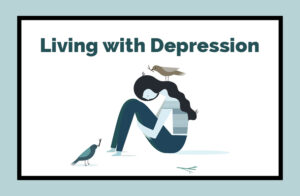Anxiety disorders cause nightmares, night terrors, night sweats, and nighttime panic attacks. Here’s how you can sleep better when you have anxiety and get a peaceful night of rest.
Today, I want to talk to you about what happens when anxiety gives you nightmares and, more to the point, how you can prevent anxiety at night and stop nightmares from happening.
Nocturnal panic attacks are when you wake up and you’re actually sort of acting out a panic attack and most of the time, you’re aware that you’re in your bedroom, you feel like you’re not quite awake, not quite asleep but there’s a definite feeling of panic.

Anxiety and panic attacks at night can begin while you are asleep, and will most often wake you up with a feeling of intense fear and bewilderment.
A nightmare is when you’re definitely asleep and your subconscious mind is presenting you with images that are frightening in nature and sometimes, this can be your anxiety manifesting in a direct or indirect way.
Other times, it can be your anxiety manifesting in a more underlying way. So, don’t expect that your anxieties in real life will automatically reflect what’s in your dreams.
As you know, dreams are often very symbolic and don’t make a lot of sense at all when you wake up. But they are your brain’s way of being able to process what you’ve been through in your waking hours and kind of help you to try and bring things to a conclusion in your mind.

So that is the purpose of your dreams and sometimes, when you have anxiety, your dreams can come into play because it’s just the way that your brain tries to cope but it’s not necessary for you to have anxiety nightmares. There are definitely ways that you can prevent them from happening and I’ve got three tips that you can use to help prevent nightmares and nightmares caused by anxiety when you’re trying to sleep.
How to Stop Nightmares from Anxiety
Nightmares related to anxiety are a very real thing. Interestingly, despite the common and severe worries that those with anxiety often suffer from every day, not everyone with anxiety is going to develop nightmares. Some actually have very restful periods of sleep, only to wake up and start experiencing anxiety-related stress.
But nightmares are still fairly common, as anxiety affects the mind. The good news is that there are strategies that can reduce nightmares and improve more restful sleep.
- ANXIETY DISORDERS CAN CAUSE NIGHTMARES
- Best Place to buy Xanax online
- Does Xanax Work effectively for chronic pain?
- Signs That You May Have Chronic Pain
- Women and Depression
How to Stop Nightmares
Stopping your nightmares can be a bit tough, because again your nightmares may not be directly anxiety-related. But there are some strategies you can try that often have an effect on how you dream. Consider the following tips:
- Write Out Your Thoughts Before Bed Sometimes a recurring negative thought can become a nightmare if it’s left unchecked. Luckily, your mind has a tendency to let go of things if you write them down, because it knows they’re on paper somewhere permanently. So when you have nervous thoughts before bed, make sure that you write them out in some type of journal so they’re gone from your head when you sleep.
-
Product on sale
 Valium ( Diazepam ) 10 mg$115.00 – $790.00 / 0.00137 Ƀ
Valium ( Diazepam ) 10 mg$115.00 – $790.00 / 0.00137 Ƀ -
Product on sale
 Xanax 2 mgOriginal price was: $7.25.$3.50Current price is: $3.50. / 0.00004 Ƀ
Xanax 2 mgOriginal price was: $7.25.$3.50Current price is: $3.50. / 0.00004 Ƀ -
Product on sale
 Roxicodone (Roxycodone) 30 mgOriginal price was: $7.45.$3.50Current price is: $3.50. / 0.00004 Ƀ
Roxicodone (Roxycodone) 30 mgOriginal price was: $7.45.$3.50Current price is: $3.50. / 0.00004 Ƀ
- Fill Time With Happy Things What you do during the day can also have an effect on nightmares. When you have severe anxiety it can be hard to take part in enjoyable activities. Even if you don’t immediately feel like it, try to do what you can to fill your day time with activities that are more likely to create pleasant memories. For example, stop watching dramas, reality shows, and horror movies, and try your best to watch comedies and cartoons instead. Switching activities in this way will ensure that your days are spent with more positive thoughts, which in turn should become more positive dreams.
- Create Upbeat White Noise If you can fall asleep with a bit of noise, consider adding some type of upbeat sounds in your bedroom. Some people choose upbeat music, but another choice may be a humor podcast or something with happy and laughing voices that you keep on a very low volume while you try to sleep. Sometimes the quiet of night can create an environment that may be a bit more prone to negative nighttime emotions, and so upbeat noises in the background may help.
- Exercise Exercise has a powerful effect on sleep. If you exercise enough during the day you’ll sleep easier and your brain will release neurotransmitters that can have a very beneficial effect on your mood. Exercising is thought to make a big difference in your ability to create memories as well, and possibly improve the way your mind translates those stories.
- Have a Relaxation Strategy When you have a nightmare, it’s often hard to fall back asleep. If you find that you rarely sleep after waking up from a nightmare, come up with a game plan. You can initiate this plan the moment you wake up that helps you become more relaxed. For example, some people find that leaving the bedroom and walking into someplace comfortable like the living room helps. Others give themselves a bit of TV to help take their mind off the nightmare. Some even find that lovemaking with their partner can make a big difference. There are plenty of strategies you can try that will improve your mood more quickly and possibly help you fall asleep as well.

These are all potential ways to cut back on your nightmares, and possibly improve your ability to sleep. But in the end, the best thing you can do is try to gain an understanding of the root of your anxiety and learn strategies for managing it.







